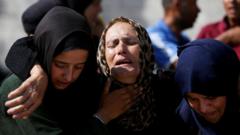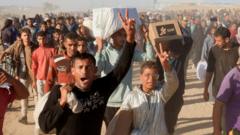In a significant blow to the Russian military, Maj. Gen. Mikhail Gudkov has been killed near the Ukrainian border, prompting scrutiny over the impact on Moscow's operations amidst ongoing conflict.
Top Russian General Killed in Combat Operations Near Ukraine

Top Russian General Killed in Combat Operations Near Ukraine
Ukrainian strike claims the life of Maj. Gen. Mikhail Gudkov, a recent naval commander promoted by Putin.
A senior Russian military official has been confirmed dead following an alleged Ukrainian strike in the Kursk region, as stated in an announcement from the Russian defense ministry on Thursday. Maj. Gen. Mikhail Gudkov, recently appointed as deputy head of the Russian Navy, was in charge of coastal and ground forces operations, and had previously led the 155th Naval Infantry Brigade during initial phases of the Ukraine invasion.
The news comes after a period of intense military activity in the area, with Gudkov's leadership playing a pivotal role in combat efforts. While Ukrainian officials have historically been reticent to officially recognize their role in targeting Russian commanders, reports suggest that the general was killed during ongoing combat operations, hinting at strategic advancements by Ukrainian forces. Sources indicate that four missiles struck the 155th brigade's headquarters located in the village of Korenevo, approximately 17 miles from the border, resulting in Gudkov's death alongside nine other individuals, many of whom were senior military personnel.
In a remark shared via social media, Oleg Kozhemyako, the governor of Primorsky, commemorated Gudkov as a “strong-willed” leader who “died in the line of duty together with his troops.” Despite the absence of additional details from the Russian side regarding other casualties, Gudkov’s death marks a notable moment as he stands as the highest-ranking Russian officer lost in a purported Ukrainian offensive since the earlier death of Lt. Gen. Yaroslav Moskalik in April.
President Vladimir Putin had previously praised Gudkov during a visit where he awarded him the Hero of the Russian Federation medal, recognizing his exemplary contributions to military operations. The loss of such a high-profile figure raises questions about the future of Russian military strategy at a time when new challenges are arising following a temporary halt in U.S. military assistance to Ukraine.
This incident not only underscores the persistent dangers faced by commanding officers in the conflict but also reflects the ongoing volatility of the situation on the ground, shaping the realities of warfare in the region.






















